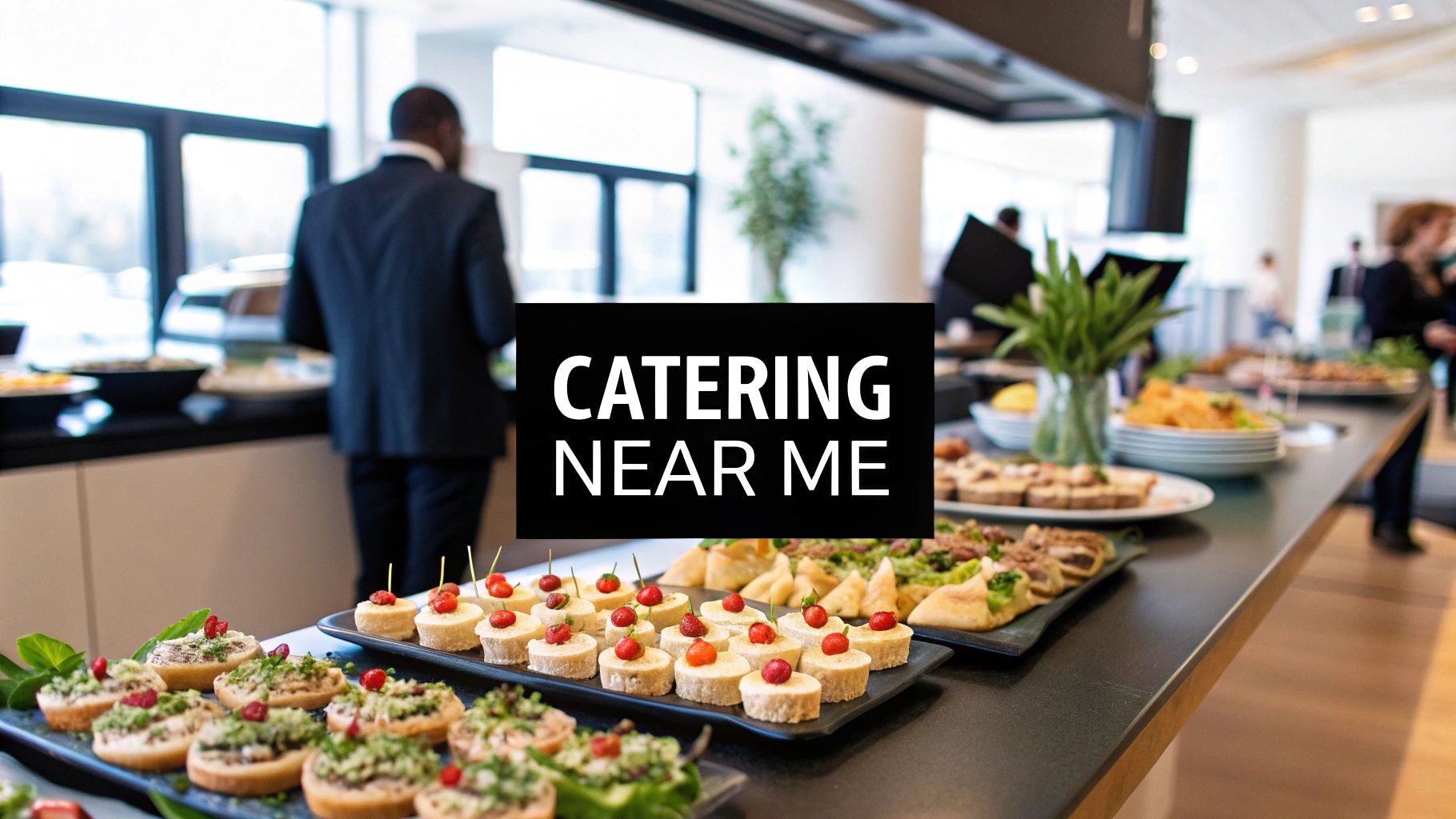Let's be honest, typing "catering near me" into a search bar is easy. What's hard is wading through the endless results to find someone you can actually trust with your company's event. The real secret is starting with a solid game plan before you even begin your search.
How to Kick Off Your Search for Local Catering
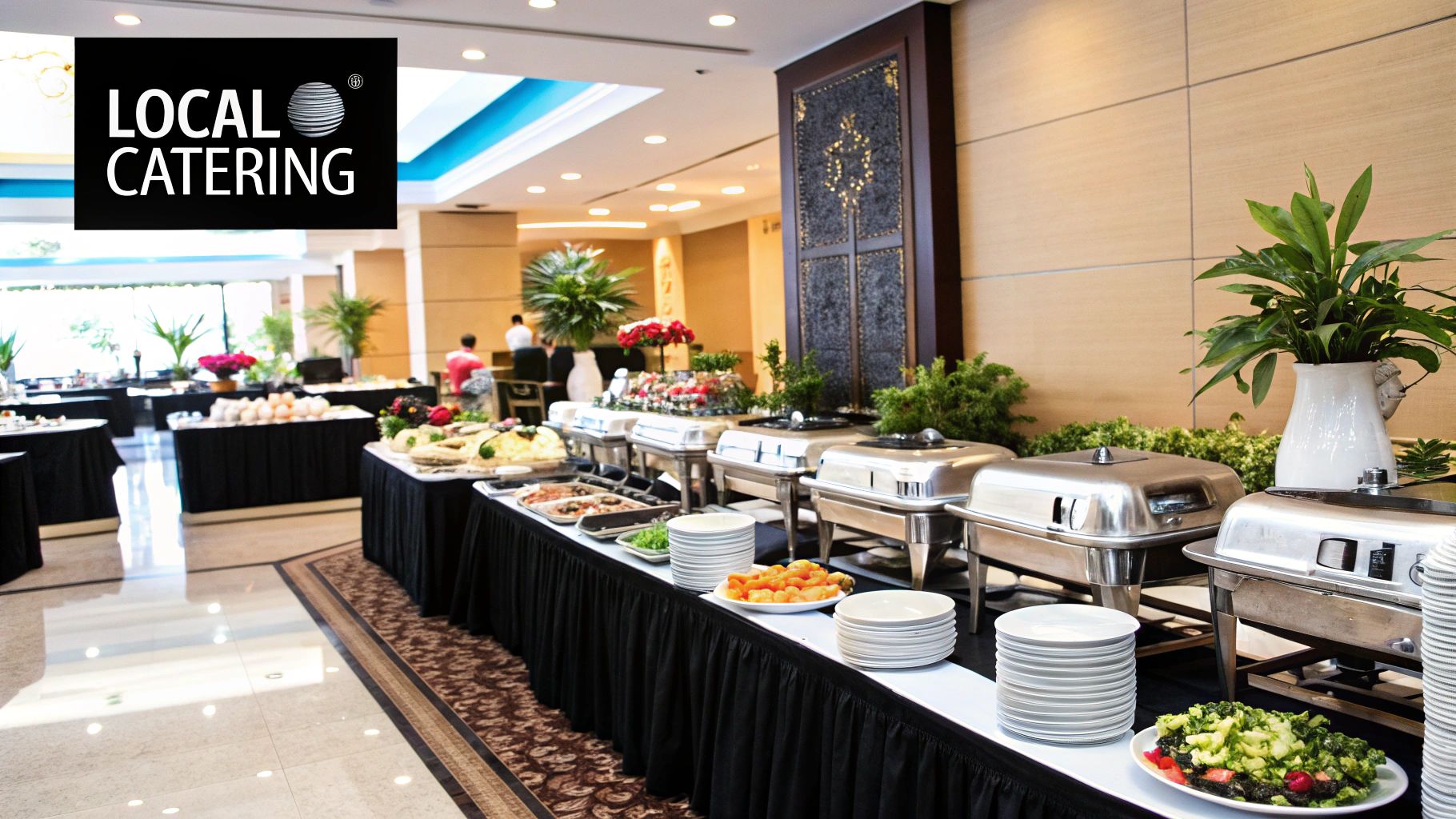
Before you fall down a rabbit hole of online menus, take a moment to figure out exactly what you need. A little bit of prep work on the front end saves a ton of headaches later and stops you from wasting time on caterers who just aren't the right fit. Think of it as creating a checklist for your perfect catering partner.
This isn't about overthinking it; it's about being smart so you can ask the right questions and move from a fuzzy idea to a clear, actionable plan.
Pin Down Your Event Needs
First things first, get the non-negotiables down on paper. This simple list will be your North Star as you start vetting different companies.
- Nail Down the Budget: What’s your total budget, or what can you spend per person? This is the most critical filter and will immediately narrow your options.
- Get a Headcount: Is this for an intimate 20-person team meeting or a massive 200-employee town hall? An accurate guest count is everything when it comes to getting a realistic quote.
- Map Out Dietary Needs: Make a list of every dietary restriction you know of—vegetarian, vegan, gluten-free, halal, you name it. This is a simple yes/no question that tells you right away if a caterer can handle your team's needs.
Create Your Starting Shortlist
Once you have your requirements locked in, you can start hunting for promising local caterers. It's a huge market—the U.S. catering industry hit USD 60.4 billion in 2022, and the corporate side is expected to grow by 8.8% each year. That’s a lot of options.
A slick website doesn’t always mean great food or reliable service. Your goal is to find genuine feedback on execution, not just slick marketing. Look for reviews that mention specifics like punctuality, staff professionalism, and how the food actually tasted on the day of the event.
Your best resource? Your own network. Ask other office managers or HR pros for their go-to recommendations. A trusted referral is worth more than a dozen anonymous online reviews. As you explore, you might also want to look into different service styles, like buffet-style office catering, to see what best fits the vibe of your event.
Vetting Caterers to Find the Perfect Fit
Okay, you’ve got your shortlist of potential caterers. Now for the real work: digging into the details to find out who can truly deliver an amazing experience for your team. This is where you separate the good from the great and make sure your corporate event goes off without a hitch.
Start by looking closely at their menus. Don't just scan the dish names; look for creativity and a focus on fresh, seasonal ingredients. More importantly, how do they handle special dietary needs? You want to see thoughtful, flavourful vegan or gluten-free options that feel like part of the main menu, not a bland afterthought.
This is a critical step. While your budget is obviously a factor, the quality of the food and service are what people remember long after the event is over.
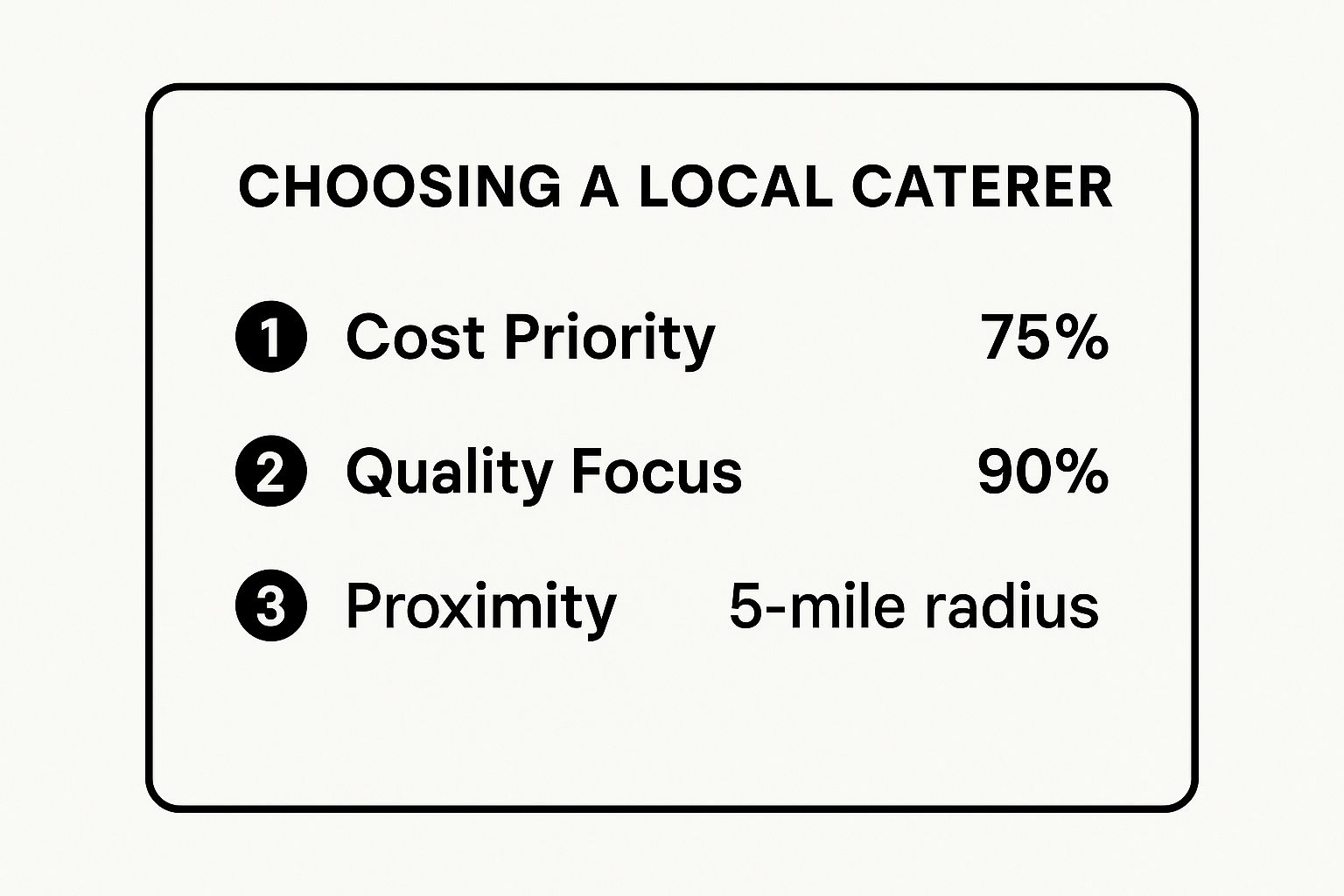
As you can see, most event planners prioritize quality and service above all else. A caterer who nails the food can make the entire event a success.
Getting Down to Brass Tacks
Once a menu catches your eye, it’s time to pick up the phone. This first call is your best chance to get a feel for their professionalism and experience. Don’t hold back—ask the tough questions that reveal how they operate.
Here are a few I always ask:
- What’s your experience with events of our size, for about XX guests?
- For a corporate lunch, what's your typical staff-to-guest ratio?
- Could you walk me through your setup and cleanup process from start to finish?
Listen carefully to their answers. You’re looking for confidence and clarity. A seasoned caterer will have these processes down to a science. In Toronto, for example, the best corporate caterers have become favourites because they've perfected their logistics. Learning the top reasons why a caterer becomes a city's go-to service can give you great insight into what separates a truly reliable partner from the rest.
A caterer’s ability to clearly explain their logistics is just as important as the quality of their food. Confidence in their process gives you peace of mind that event day will run smoothly, without any last-minute surprises.
A Framework for Comparison
To keep things organized and make an objective choice, I recommend using a simple comparison chart. It helps you see, at a glance, how your top contenders stack up against each other based on the criteria that matter most to you.
Catering Service Evaluation Checklist
| Evaluation Criteria | Caterer A | Caterer B | Caterer C |
|---|---|---|---|
| Menu Quality & Creativity | |||
| Dietary Accommodation | |||
| Responsiveness & Professionalism | |||
| Experience with Corporate Events | |||
| Clear Pricing & Inclusions | |||
| Positive Online Reviews | |||
| Logistics (Setup/Cleanup) |
Once you've filled this out, the best choice often becomes much clearer. It takes the guesswork out of the decision and ensures you've covered all your bases before signing a contract.
Making Sense of Catering Quotes and Contracts
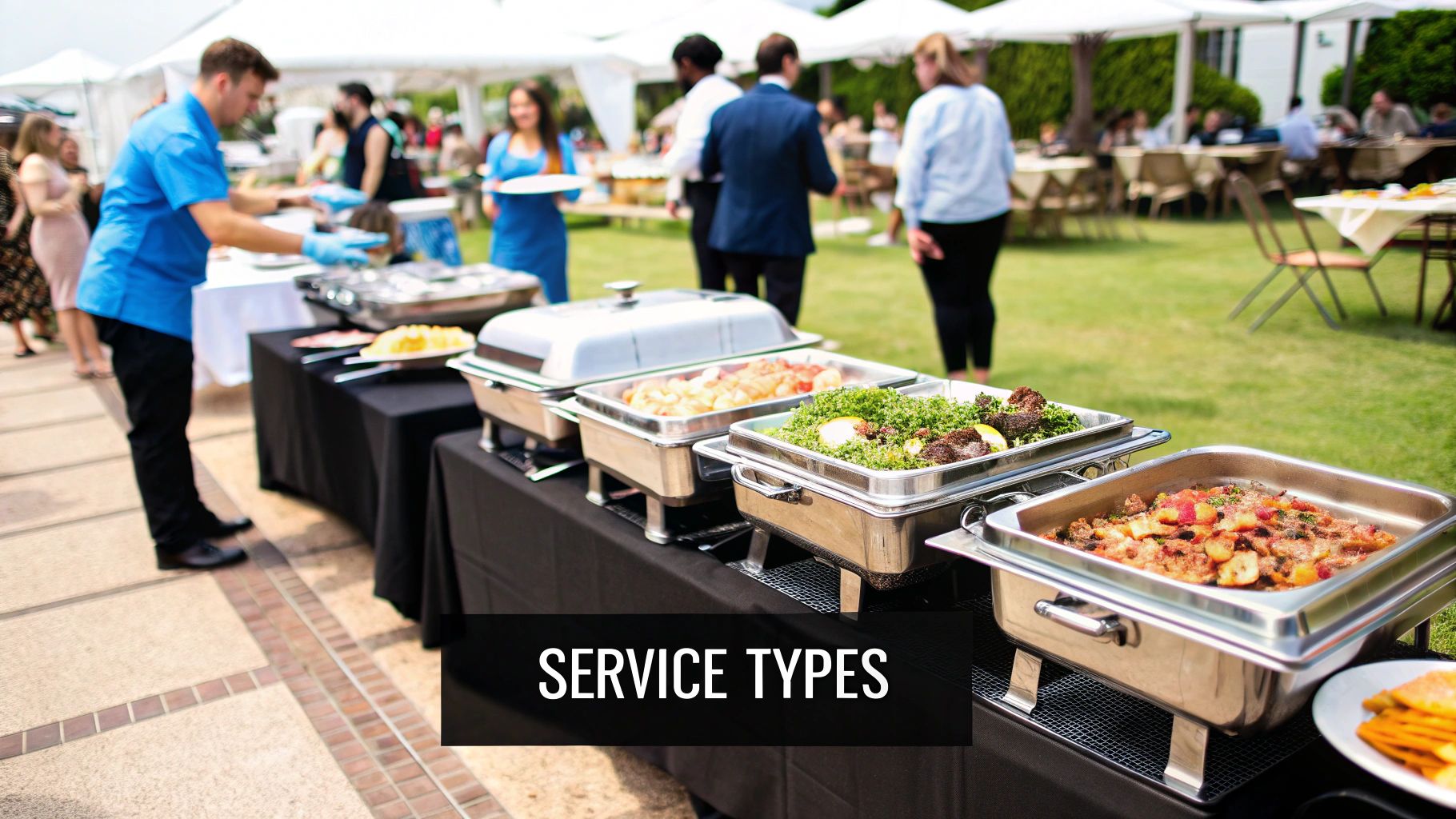
Alright, the catering proposals have started to roll in. It can be tempting to just scan for the final price, but this is where the real due diligence begins. Taking a few extra minutes to comb through every line item now can save you from a world of headaches and surprise costs later.
Think of the quote as the blueprint for your event's success. A really detailed proposal is actually a great sign—it shows the caterer is transparent and has thought through everything. Your job is to make sure their blueprint perfectly matches your vision.
What to Look for in Your Quote
A solid quote will break down every single cost. You shouldn't see vague categories; instead, you want an itemized list that separates food from labour, rentals, and any other fees. This is the best way to spot those pesky hidden costs before they become a problem.
Here are a few specific things to keep an eye on:
- Service Fees: This one trips up a lot of people. It's usually a percentage of the total food and beverage cost, and it covers the caterer's operational expenses. Crucially, this is almost never a gratuity for the staff.
- Equipment Rentals: Does your event need linens, plates, glassware, or serving equipment? Make sure you know what's included in the package and what's considered an add-on rental.
- Staffing Costs: The quote should clearly state how many staff members you're getting (like servers or chefs) and for how many hours. You don't want to be short-staffed or get a bill for unexpected overtime.
- Gratuity: Always ask about this. Some caterers build it into the final price, while others leave it up to you. It's best to clarify their policy upfront.
The Contract: Your Safety Net
Once you're happy with the quote, it's time for the contract. This document makes everything official and protects both you and the caterer. It’s a legally binding agreement, so if something you discussed isn't in writing, you have to assume it's not part of the deal.
With the U.S. catering market valued at a whopping USD 72.67 billion in 2024, professionalism and clear agreements are more important than ever.
Before you even think about signing, confirm these three things are crystal clear: the payment schedule, the cancellation policy, and proof of their liability insurance. These are your non-negotiables for protecting your budget and giving you peace of mind.
If you want to see what a straightforward, all-inclusive quote looks like, checking out pre-set options can be a big help. For example, our corporate catering packages lay everything out clearly, so you know exactly what you're getting from the start.
Why You Should Never Skip the Tasting and Site Visit
Think about it: you wouldn't buy a car without a test drive. So why would you book a caterer without actually tasting their food? A menu tasting is the single most important step you can take to guarantee quality before signing on the dotted line. It reveals everything a polished website or a five-star review simply can’t.
This is where you get to see if the food truly lives up to the hype. Flavour is obviously key, but look beyond that. How is the food presented? Are the portion sizes right for a midday corporate lunch, or are they too skimpy? Most importantly, does the hot food arrive actually hot? These are the little details that elevate a simple meal into a great experience for your team.
A tasting isn't just a simple yes-or-no vote on the food. It's your best chance to collaborate directly with the chef. Use this time to give specific feedback and request tweaks, ensuring the final menu is exactly what you had in mind.
How to Get the Most Out of the Tasting
Walk into the tasting with a plan. Know which dishes you're seriously considering for your event and focus your attention there. This isn't the time for random sampling; it's a focused evaluation.
- Request Your Shortlist: Ask to try the core menu items you’re most likely to order, not just the fancy specials they want to show off.
- Talk About Presentation: Ask them how the food will actually be served on the day—will it be a buffet setup, plated, or in individual boxes? What you see in a tasting room might be different from the real thing.
- Be Specific with Feedback: Vague comments like "I don't like it" aren't helpful. Instead, offer constructive notes like, "Could the chicken use a bit more seasoning?" or "I think a lighter sauce would work better for a lunch event."
The Sneaky Value of a Site Visit
Once you’ve found a caterer whose food you love, the next step is a site visit. Walking through your office or event space together is an absolute game-changer for ironing out logistics ahead of time. It might seem like an extra step, but it helps everyone visualize how the day will unfold and spot potential problems before they happen.
This is where you figure out the nitty-gritty. Will their delivery carts fit through the service elevator? Is there a convenient power outlet for their warming ovens? A simple walkthrough lets the caterer see the space's quirks and possibilities, preventing any last-minute surprises. It’s a small investment of time that pays off with a smooth, professional, and stress-free event.
Making Sure the Big Day Goes Off Without a Hitch
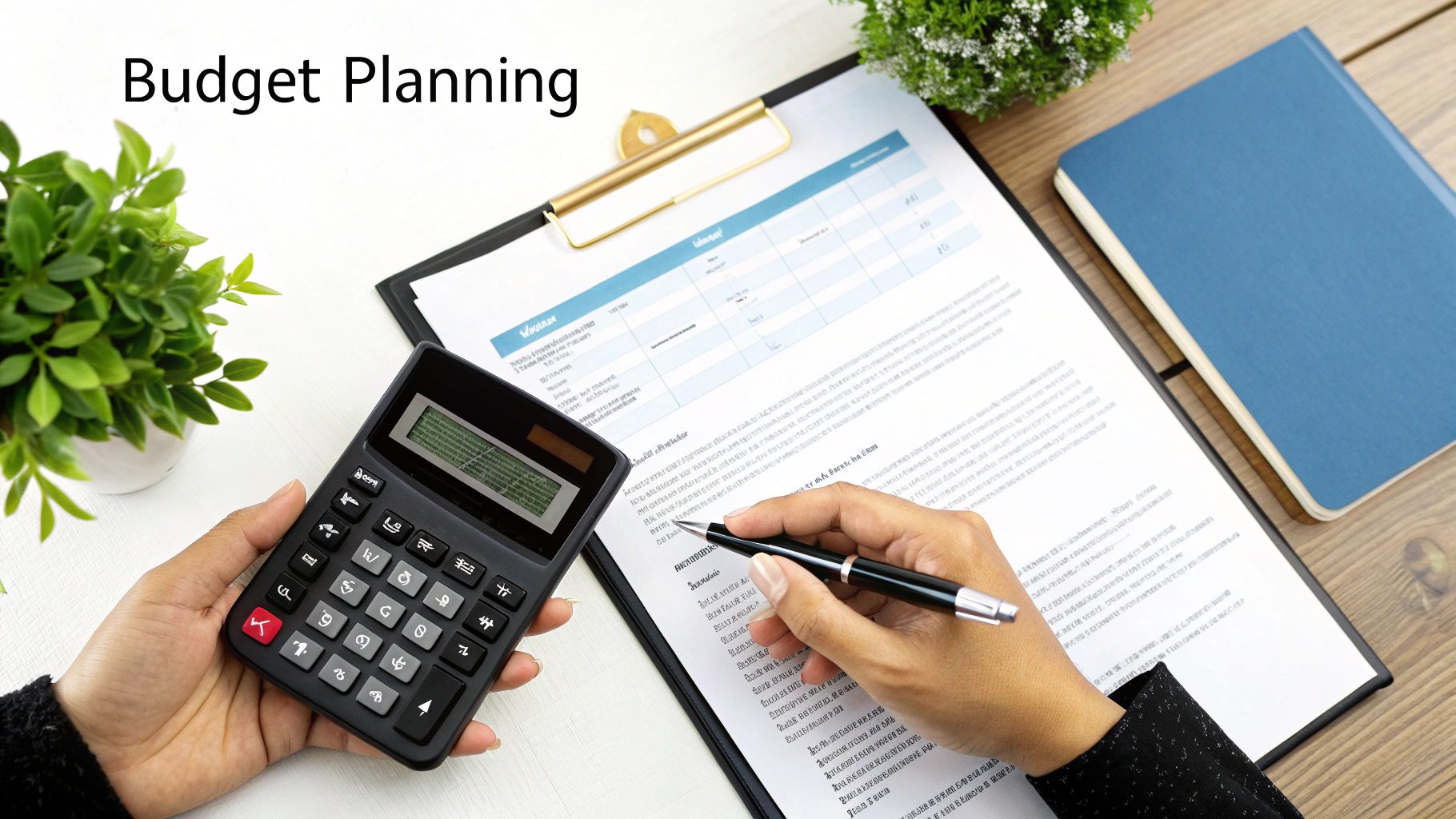
You’ve found the perfect caterer and signed the contract. Now what? The final stretch is all about nailing down the details. This is where meticulous planning and clear communication turn a good event into a great one. The goal here is to leave absolutely nothing to chance.
A successful event runs on a clear, shared schedule. Don't just tell them "lunch is at noon." You need to get granular. Work directly with your caterer to build a detailed timeline covering everything from their arrival and setup time to the exact moment service begins and when they'll start to clean up.
Your Final Coordination Checklist
In the final days before the event, a simple checklist can be a lifesaver. It’s the best way to make sure no small but crucial detail gets missed in the rush.
- Lock in Your Numbers: Give the caterer your final, confirmed guest count at least a week before the event. This is critical for them to finalize their food orders and staff scheduling.
- Reconfirm Special Meals: Send over the finalized list of all dietary needs, restrictions, and allergies. Just as important, ask how they plan to label these special meals so guests can easily and safely identify them.
- Map Out the Logistics: Don’t assume the delivery team knows the building. Give them crystal-clear instructions for parking, where to load in, and the specific room or area for setup. A simple hand-drawn map can work wonders.
- Assign Key Contacts: Choose one person from your company to be the go-to contact on the day of the event, and get the name of their on-site lead. This ensures that if any issues pop up, there's a clear and simple communication channel.
I can't stress this enough: having a single point of contact on both sides is the best way to manage any day-of surprises. Instead of five different people trying to solve a problem, one person is empowered to make decisions and keep the event moving smoothly.
When you iron out these final details, you’re not just helping the caterer—you’re helping yourself. It means they show up completely prepared, and you can relax and focus on your guests, knowing the food is in expert hands.
Got Questions? We’ve Got Answers
Even the most seasoned office manager runs into a few head-scratchers when looking for corporate catering. Let's walk through some of the most common questions I hear, so you can find the right fit for your next event without any guesswork.
How Far Out Should I Book a Caterer?
For any big corporate gathering—think 50+ guests—you’ll want to start your search at least a month ahead of time. This gives you a comfortable buffer to compare a few options, maybe do a tasting, and get the contract sorted without that last-minute scramble.
If it's just a smaller team lunch, one or two weeks' notice can work. That said, the really great local spots get snapped up fast, especially around the holidays.
Here's my personal rule: the more critical the event, the more runway you give yourself. If I'm planning something for a key client or celebrating a huge company win, I’m looking at vendors six to eight weeks out. It's the only way to guarantee I get my top choice.
What's a Realistic Price Per Person for Catering?
The answer really depends on where you are, what kind of food you're ordering, and the service style. It's a classic "it depends" situation. But to give you a solid baseline for a quality corporate lunch in a major Canadian city, here’s what you can generally expect to budget:
- Buffet-Style or Platters: $25 – $45 per person
- Individually Boxed Meals: $20 – $35 per person
These figures should cover the food, delivery, and a basic setup. Always, always ask if taxes, service fees, or gratuity are built into that initial quote to avoid any surprises later on.
What’s the Best Way to Handle Dietary Needs?
Being proactive and organized is the key here. First, send out a survey to your team well before the event to get a complete picture of everyone's dietary restrictions. Go beyond just allergies—ask about preferences like vegan, halal, or gluten-free.
Then, give your caterer a single, clear list of what you need. A truly professional caterer won't just offer a sad-looking substitute; they'll create something just as delicious as the main meal and label everything meticulously to prevent any confusion. That kind of care is what separates the good from the great.
Ready to take the stress out of feeding your team? At Shawarma Moose, we offer reliable, delicious, and fully customizable corporate catering solutions for any event size. From hot buffet trays to individually packed halal, vegan, and gluten-free meals, we deliver unforgettable flavour every time.
Explore our corporate catering options and get a free quote today!
